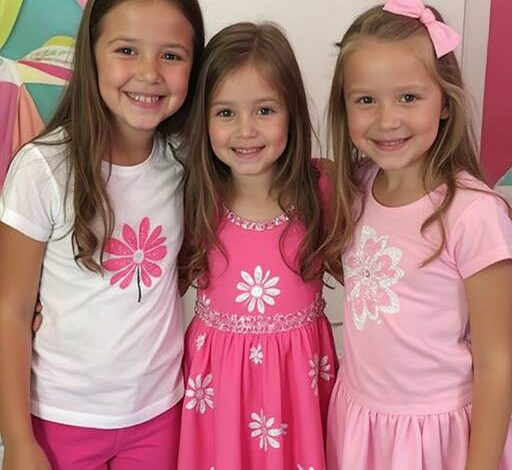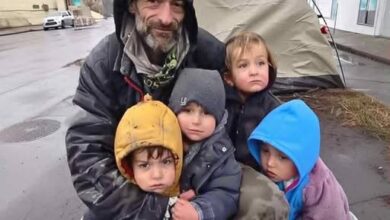
I Had Doubts about Dating a Single Dad — But What I Discovered After He Moved In Left Me Shocked
When I first met Julian, I wasn’t looking for love. I had just come out of a long, exhausting relationship and had sworn off anything that involved emotional investment or, frankly, compromise. But Julian had a way of slipping past every wall I built. He was gentle, attentive, and had this quiet steadiness about him that felt like safety, something I hadn’t realized I was craving.
We met at a community book club, of all places. I’d joined to keep my evenings from feeling too empty, and he showed up halfway through a discussion about The Nightingale. He didn’t say much that day, but later he waited for me outside and asked if I wanted to grab a coffee. That was how it began, slow, easy, innocent.
He told me early on that he was a single dad with three daughters: twins aged eight, and the youngest, just five. Their mother had left years ago, he said, unable to handle the responsibilities of motherhood. There was something in his voice when he spoke about it — a mix of pain and resignation. I admired him for holding everything together. I told myself that if a man could care that deeply for his children, he must be capable of loving with depth and loyalty.
Our relationship developed quickly. He didn’t play games, didn’t disappear for days, didn’t make me question where I stood. He made dinner for me, fixed my leaky sink without being asked, and remembered my favorite tea. And though I’d always imagined myself with someone unattached, I found myself drawn in not just to him, but to the idea of his family.
When I met his daughters, I was nervous. I wanted them to like me. The twins were shy at first, clutching each other’s hands, while the youngest, Molly, studied me with curious brown eyes. But after an hour of playing board games and eating homemade cookies, they warmed up. Molly even climbed into my lap by the end of the night, giggling when I tickled her.
I remember thinking, Maybe this could really work.
Within six months, Julian started spending more time at my house. At first, just weekends. Then, a few days during the week. Eventually, he brought the girls over too, saying it would be nice for them to have “a home that feels full.”
It made sense that my house had space, and I didn’t mind. I was in love, and part of me wanted to believe we were building something lasting.
When he suggested officially moving in, I hesitated for maybe two seconds. He’d been so good to me. What could go wrong?
I wish I’d listened to that flicker of doubt.
The first few weeks were fine. The girls adjusted easily, laughing through the hallways, decorating their shared bedroom with stuffed animals and drawings. I learned their routines, bedtime stories, breakfast preferences, and the shows they liked to watch. Julian helped out around the house, cooked dinner, and made everything feel… domestic. Stable.
But soon, little things started to feel off.
At first, it was just misplaced items, small, almost forgettable things. My favorite earrings vanished from my jewelry box. A bottle of expensive face serum disappeared from the bathroom. I assumed the girls might have moved them while playing.
Then came the noises at night. Light footsteps outside my bedroom door, soft giggles, whispers that faded when I got up. I brushed it off, kids exploring a new home, maybe.
But the feeling that something wasn’t right grew heavier by the day.
Julian had started locking his study — a room he’d claimed after moving in. He said he needed privacy to work from home, which seemed fair. Still, I couldn’t shake the unease that settled in my chest whenever he closed that door behind him.
Then, one afternoon, everything changed.
I came home early from work. I was supposed to have a late meeting, but it got canceled. I thought I’d surprise Julian and the girls with dinner.
When I pulled into the driveway, I noticed his car was there, but the house was strangely quiet. Usually, by that hour, the girls would be running around or watching cartoons.
Inside, the lights were dim. The air felt thick, heavy somehow.
“Julian?” I called. “Girls?”
No answer.
Then I heard faint music coming from the study.
I frowned. That door was usually locked. But when I turned the handle, it opened easily this time.
The sight that met me made my stomach twist.
The room was filled with boxes — dozens of them, stacked in neat rows against the walls. Some were labeled, others weren’t. I recognized my handwriting on a few. They were my boxes. The ones I’d stored in the attic.
My hands shook as I pulled one open. Inside were my old photo albums, but when I flipped through them, the pictures had been cut. My face was missing from every photo. Literally sliced out.
I stumbled back, my heart pounding.
In the corner, on Julian’s desk, sat a laptop surrounded by piles of papers. I glanced at the screen. There were files open with names, dates, addresses, and photos. It looked like a list. At first, I thought it was work-related, until I saw my name at the top. Underneath it were private notes and things. My work schedule. My parents’ address. The name of my childhood pet.
Then the next tab caught my eye.
It was an online marketplace, a resale site. And there were listings. Jewelry, cosmetics, designer shoes. All mine. My missing earrings. My serum. Even a watch that my late father had given me.
He’d been selling my belongings.
My chest constricted, and I had to steady myself against the desk.
That’s when I heard a voice behind me.
“Sarah?”
Julian stood in the doorway, holding a grocery bag. He looked surprised for a moment, then his expression hardened.
“What are you doing in here?”
I could barely speak. “What is all this?”
He set the bag down slowly. “You shouldn’t be snooping through my things.”
“My things,” I snapped. “These are my boxes! You’ve been stealing from me!”
He sighed, as if I were being unreasonable. “You don’t understand—”
“Then explain it!” I demanded.
He rubbed his temples. “I didn’t take them to steal. I just… needed money. Temporary money. The girls— they have school expenses, clothes, medical bills. I thought I could replace them before you noticed.”
I stared at him, disbelief flooding through me. “You’ve been selling my things behind my back and lying to my face, and you think that’s an excuse?”
His tone shifted, sharp now. “You wouldn’t understand what it’s like raising three kids alone. You have everything handed to you, Sarah. You wouldn’t miss a few things.”
My voice trembled. “I let you move in because I trusted you.”
He stepped closer, his expression darkening. “And I appreciated that. But you don’t get to treat me like some charity case. I’ve done more for you than you realize.”
Something in his tone chilled me. There was no remorse — just irritation. Like I was the problem for discovering the truth.
“I want you out,” I said firmly. “You and the girls. Today.”
He laughed — low and bitter. “You think you can just kick us out? This is their home now. You said so yourself.”
I felt my stomach drop. He was right — I’d said that. Naively, lovingly. But legally, it was still my house.
“I’ll call the police,” I warned.
For a second, his face twisted — anger, then something colder. “You’d really do that? You’d ruin their lives over a few trinkets?”
I stood my ground. “Get out.”
He stared at me for a long moment, then turned and walked away without another word. I heard him calling the girls, telling them to pack up. Within an hour, they were gone.
The silence that followed was suffocating.
I thought that would be the end of it.
But two nights later, I woke up to the sound of something clattering downstairs. My heart leapt into my throat. I grabbed my phone, ready to dial 911, and crept toward the stairs.
The back door was wide open, cold air spilling in. My kitchen drawers were pulled out, and several items were missing silverware, a few appliances.
I called the police. They took a report, though the officer’s tone made it clear they suspected it was someone I knew.
The next morning, I checked the resale site again. My missing items were already listed.
Julian.
He didn’t even try to hide it.
I filed a restraining order that same day. It wasn’t easy — the paperwork, the questioning, the humiliation of admitting how completely I’d been manipulated. But I did it.
He disappeared for a while after that. Months passed without a trace. I changed my locks, installed cameras, and began to rebuild my life piece by piece. I focused on work, therapy, and healing.
And then, one afternoon nearly six months later, I received a call from a woman I didn’t know.
“Is this Sarah Collins?” she asked.
“Yes,” I said cautiously.
“My name’s Lisa. I think we might have something in common. Did you date a man named Julian? Single dad, three girls?”
My blood ran cold. “Yes. Why?”
She sighed. “I’ve been dating him for three months. He moved in two weeks ago. I found your name on some of his old documents. I thought it was odd, so I looked you up.”
My knees went weak.
We spoke for an hour. She told me everything about how he’d charmed her, moved in quickly, and started selling her belongings, just like he’d done to me. The same words, the same lies. The same story about his ex.
When I hung up, I sat in silence for a long time. Anger gave way to something deeper — pity, maybe. But mostly, I felt a strange sense of closure.
He wasn’t who I thought he was. He had never been.
I don’t know what happened to Julian after that. Lisa filed her own report, and apparently, he skipped town. Maybe he moved on to another city, another woman. Maybe one day he’ll get caught.
But I learned something important in the wreckage he left behind.
Trust isn’t something you give blindly because someone seems kind. It’s something earned slowly, through actions that stand up even when no one is watching.
For a long time, I blamed myself for letting him in. For believing his stories. For not seeing the warning signs. But now, I realize that the shame was never mine to carry. He was a con man dressed as a father, a thief who weaponized vulnerability.
My house feels different now, quieter, lighter. The echoes of laughter from those months still linger sometimes, but so does the strength I found after everything fell apart.
I don’t regret loving him. I regret trusting someone who mistook kindness for weakness.
And every time I walk past that locked study door now emptied, repainted, and turned into a library, I remember the moment I opened it. The moment the truth came spilling out.
The moment I stopped being someone who could be fooled.
Because sometimes, betrayal doesn’t destroy you.
It reveals exactly who you were meant to become.




